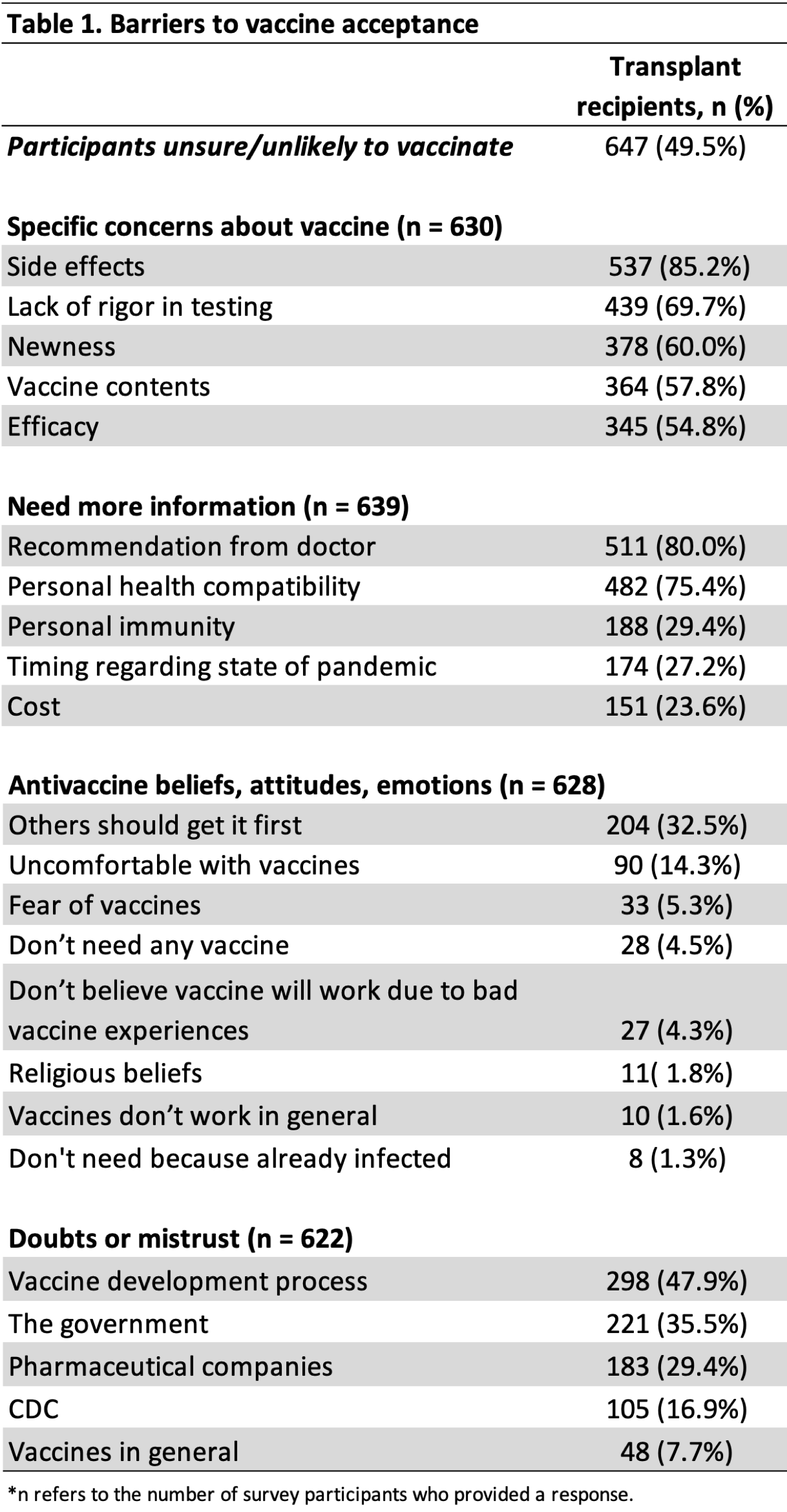Solid Organ Transplant Recipient Attitudes Towards a SARS-CoV-2 Vaccine
M. Ou1, B. Boyarsky1, L. Zeiser1, T. Chiang1, J. Ruddy1, S. Rasmussen1, J. Martin2, J. Russell2, C. Durand1, R. Avery1, W. Werbel1, M. Cooper3, A. Massie1, D. Segev1, J. Garonzik-Wang1
1Johns Hopkins, Baltimore, MD, 2National Kidney Foundation, New York, NY, 3Medstar Georgetown Transplant Institute, Washington, DC
Meeting: 2021 American Transplant Congress
Abstract number: 19
Keywords: Vaccination
Topic: Clinical Science » Infectious Disease » All Infections (Excluding Kidney & Viral Hepatitis)
Session Information
Session Name: COVID-19 Session 1
Session Type: Rapid Fire Oral Abstract
Date: Saturday, June 5, 2021
Session Time: 4:30pm-5:30pm
 Presentation Time: 4:30pm-4:35pm
Presentation Time: 4:30pm-4:35pm
Location: Virtual
*Purpose: An effective and widely-accepted SARS-CoV-2 vaccine could protect the community and vulnerable populations. We investigated the attitudes of solid organ transplant recipients (SOTRs) towards a SARS-CoV-2 vaccine and identified potential barriers to vaccination.
*Methods: We conducted a national survey of SOTRs between November 11 – December 2, 2020 through the network and social media platforms of the National Kidney Foundation. We studied 3 major domains: a) attitudes towards a vaccine, b) impact of the pandemic on daily life, and c) impact on mental health.
*Results: Among 1308 SOTRs, 783 (59.9%) were female and 1035 (79.1%) were White. Respondents were evenly distributed throughout the US and were largely college graduates (829, 63.4%) and married (830, 63.5%). Half (647, 49.5%) of SOTRs would be either unsure or unwilling to receive a SARS-CoV-2 vaccine once available (Table 1). Major concerns included side effects (537, 85.2%), lack of rigor in vaccine development (439, 69.7%), and incompatibility with organ transplant (482, 75.4%). However, 1135 (86.8%) SOTRs would be willing to receive a vaccine if recommended by a transplant provider. A small fraction (161, 12.3%) were in self-isolation and severe anxiety related to the COVID-19 pandemic remained low (25, 1.9%). There were no significant differences in vaccine attitudes after the announcement of 94.5% efficacy in the mRNA-1273 vaccine (Moderna, Inc.).
*Conclusions: Transplant recipients expressed large amounts of skepticism in a potential SARS-CoV-2 vaccine, even after announcements of high vaccine efficacy. However, transplant providers may be the defining influence in vaccine acceptance due to the trust vested in them.
To cite this abstract in AMA style:
Ou M, Boyarsky B, Zeiser L, Chiang T, Ruddy J, Rasmussen S, Martin J, Russell J, Durand C, Avery R, Werbel W, Cooper M, Massie A, Segev D, Garonzik-Wang J. Solid Organ Transplant Recipient Attitudes Towards a SARS-CoV-2 Vaccine [abstract]. Am J Transplant. 2021; 21 (suppl 3). https://atcmeetingabstracts.com/abstract/solid-organ-transplant-recipient-attitudes-towards-a-sars-cov-2-vaccine/. Accessed February 19, 2026.« Back to 2021 American Transplant Congress

